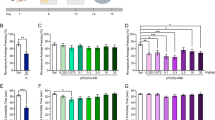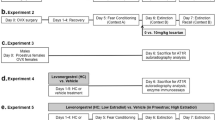Abstract
Rationale
Cortisol levels rise sharply immediately after electroconvulsive therapy (ECT); the resultant stimulation of steroid receptors in the hippocampus may be beneficial or harmful to cognition, depending on the magnitude of the stimulation. Steroid mechanisms may therefore modulate ECT-induced amnesia.
Objectives
Using mifepristone (a glucocorticoid receptor antagonist) as a chemical probe, we sought to examine steroid mechanisms in an animal model of ECT-induced retrograde amnesia.
Materials and methods
Adult, male Wistar rats (n = 68) trained in a step-through passive-avoidance task were randomized to receive mifepristone (20 or 40 mg kg−1 day−1) or vehicle (control). These treatments were administered 1 day before the electroconvulsive shock (ECS) course and, again, 1 h before each of five once-daily true (30 mC) or sham ECS. Recall of pre-ECS learning was tested 1 day after the last ECS.
Results
Relative to sham ECS, true ECS resulted in significant retrograde amnesia in the vehicle group but not in either of the mifepristone groups. In sham ECS-treated animals, mifepristone did not significantly influence recall. In ECS-treated rats, the higher but not the lower dose of mifepristone was associated with significant protection against the retrograde amnesia evident in the vehicle group.
Conclusion
Mifepristone administered before the ECT seizure may attenuate ECT-induced retrograde amnesia. This suggests that glucocorticoid mechanisms may contribute to ECT-induced retrograde amnesia.
Similar content being viewed by others
References
Abrams R (1988) Electroconvulsive therapy. Oxford University Press, New York
Agarwai MK (1996) The antiglucocorticoid action of mifepristone. Pharmacol Ther 70:183–213
Anand A, Andrade C, Sudha C, Guido S, Venkataraman BV (2001) Phenylephrine and ECS-induced retrograde amnesia. J ECT 17:166–169
Andrade C (1992) The mechanism of action of ECT. In: Gangadhar BN (ed) Proceedings of the national workshop on ECT: priorities for research and practice in India, NIMHANS, Bangalore, pp 107–130
Andrade C (2005) Electroconvulsive therapy. In: Bhugra D, Ranjith G, Patel V (eds) Handbook of psychiatry: a South Asian perspective. Byword Publishers, New Delhi, pp 553–568
Andrade C, Thyagarajan S, Vinod PS, Srikanth SN, Rao NSK, Chandra JS (2002a) Effect of stimulus intensity and number of treatments on ECS-related seizure duration and retrograde amnesia in rats. J ECT 18:197–202
Andrade C, Kurinji S, Sudha S, Chandra JS (2002b) Effects of pulse amplitude, pulse frequency, and stimulus duration on seizure threshold: a laboratory investigation. J ECT 18:144–148
Aperia B, Bergman H, Engelbrektson K, Thoren M, Wetterberg L (1985) Effects of electroconvulsive therapy on neuropsychological function and circulating levels of ACTH, cortisol, prolactin, and TSH in patients with major depressive illness. Acta Psychiatr Scand 72:536–541
Belanoff JK, Rothschild AJ, Cassidy F, DeBattista C, Baulieu E-E, Schold C, Schatzberg AF (2002) An open label trial of C-1073 (mifepristone) for psychotic major depression. Biol Psychiatry 52:386–392
Borowicz KK, Luszczki J, Swiader M, Kleinrok Z, Czuczwar SJ (2004) Influence of sexual hormone antagonists on the anticonvulsant action of conventional antiepileptic drugs against electrically- and pentylenetetrazol-induced seizures in mice. Eur Neuropsychopharmacol 14:77–85
Capasso A, Casciano C, Loizzo A (2002) Dexamethasone reduces morphine-induced Straub reaction in mice. J Pharm Pharmacol 54:983–987
de Kloet ER, Oitzl MS, Joels M (1999) Stress and cognition: are corticosteroids good or bad guys? Trends Neurosci 22:422–426
Erickson K, Drevets W, Schulkin J (2003) Glucocorticoid regulation of diverse cognitive functions in normal and pathological emotional states. Neurosci Biobehav Rev 27:233–246
Gold PW, Drevets WC, Charney DS (2002) New insights into the role of cortisol and the glucocorticoid receptor in severe depression. Biol Psychiatry 52:381–385
Heffelfinger AK, Newcomer JW (2001) Glucocorticoid effects on memory function over the human life span. Dev Psychopathol 13:491–513
Heikinheimo O, Pesonen U, Huupponen R, Koulu M, Lahteenmaki P (1994) Hepatic metabolism and distribution of mifepristone and its metabolites in rats. Hum Reprod 9(Suppl 1):40–46
Kamath S, Andrade C, Faruqi S, Venkataraman BV, Naga Rani MA, Candade VS (1997) Evaluation of pre-ECS antihypertensive drug administration in the attenuation of ECS-induced amnesia in rats. Convuls Ther 13:185–195
Koenig HN, Olive MF (2004) The glucocorticoid receptor antagonist mifepristone reduces ethanol intake in rats under limited access conditions. Psychoneuroendocrinology 29:999–1003
Korte SM, de Boer SF, de Kloet ER, Bohus B (1995) Anxiolytic-like effects of selective mineralocorticoid and glucocorticoid antagonists on fear-enhanced behavior in the elevated plus-maze. Psychoneuroendocrinology 20:385–394
Kronfol Z, Hamdan-Allen G, Goel K, Hill EM (1991) Effects of single and repeated electroconvulsive therapy sessions on plasma ACTH, prolactin, growth hormone and cortisol concentrations. Psychoneuroendocrinology 16:345–352
Lerer B (1985) Studies on the role of brain cholinergic systems in the therapeutic mechanisms and adverse effects of ECT and lithium. Biol Psychiatry 20:20–40
Lerer B, Stanley M, McIntyre I, Altman H (1984) Electroconvulsive shock and brain muscarinic receptors: relationship to anterograde amnesia. Life Sci 35:2659–2664
Lupien SJ, Lepage M (2001) Stress, memory, and the hippocampus: can’t live with it, can’t live without it. Behav Brain Res 127:137–158
McCullers DL, Sullivan PG, Scheff SW, Herman JP (2002) Mifepristone protects CA1 hippocampal neurons following traumatic brain injury in rat. Neuroscience 109:219–230
McDaniel WW, Sahota AK, Vyas BV, Laguerta N, Hategan L, Oswald J (2006) Ketamine appears associated with better word recall than etomidate after a course of 6 electroconvulsive therapies. J ECT 22:103–106
Neylan TC, Canick JD, Hall SE, Reus VI, Sapolsky RM, Wolkowitz OM (2001) Cortisol levels predict cognitive impairment induced by electroconvulsive therapy. Biol Psychiatry 50:331–336
Oitzl MS, Fluttert M, Sutanto W, de Kloet ER (1998a) Continuous blockade of brain glucocorticoid receptors facilitates spatial learning and memory in rats. Eur J Neurosci 10:3759–3766
Oitzl MS, Fluttert M, de Kloet ER (1998b) Acute blockade of hippocampal glucocorticoid receptors facilitates spatial learning in rats. Brain Res 797:159–162
Rao NSK, Andrade C, Reddy KP, Madappa KN, Thyagarajan S, Chandra JS (2002) Memory protective effect of indomethacin against electroconvulsive shocks induced by retrograde amnesia in rats. Biol Psychiatry 51:770–773
Sackeim HA (1992) The cognitive effects of electroconvulsive therapy. In: Thal LJ, Moos WH, Gamzu ER (eds) Cognitive disorders: pathophysiology and treatment. Marcel Dekker, New York, pp 183–228
Sackeim HA, Prudic J, Devanand DP, Nobler MS, Lisanby SH, Peyser S, Fitzsimons L, Moody BJ, Clark J (2000) A prospective, randomized, double-blind comparison of bilateral and right unilateral electroconvulsive therapy at different stimulus intensities. Arch Gen Psychiatry 57:425–434
Sousa N, Almeida OF (2002) Corticosteroids: sculptors of the hippocampal formation. Rev Neurosci 13:59–84
Stewart CA, Reid IC (1994) Ketamine prevents ECS-induced synaptic enhancement in rat hippocampus. Neurosci Lett 178:11–14. Erratum in: Neurosci Lett 1996; 210:218
Sudha S, Andrade C, Anand A, Guido S, Venkataraman BV (2001) Nitroprusside and ECS-induced retrograde amnesia. J ECT 17:41–44
Vinekar AS, Andrade C, Sriprada VT, George J, Joseph T, Chandra JS (1998) Attenuation of ECS-induced retrograde amnesia by using an herbal formulation. J ECT 14:83–88
Weizman A, Gil-Ad I, Grupper D, Tyano S, Laron Z (1987) The effect of acute and repeated electroconvulsive treatment on plasma beta-endorphin, growth hormone, prolactin and cortisol secretion in depressed patients. Psychopharmacology (Berl) 93:122–126
Yang Y, Cao J, Xiong W, Zhang J, Zhou Q, Wei H, Liang C, Deng J, Li T, Yang S, Xu L, Xu L (2003) Both stress experience and age determine the impairment or enhancement effect of stress on spatial memory retrieval. J Endocrinol 178:45–54
Yau JL, Noble J, Seckl JR (1999) Continuous blockade of brain mineralocorticoid receptors impairs spatial learning in rats. Neurosci Lett 277:45–48
Young AH, Gallagher P, Watson S, Del-Estal D, Owen BM, Nicol Ferrier I (2004) Improvements in neurocognitive function and mood following adjunctive treatment with mifepristone (RU-486) in bipolar disorder. Neuropsychopharmacology 29:1538–1545
Zis AP, Yatham LN, Lam RW, Clark CM, Srisurapanont M, McGarvey K (1996) Effect of stimulus intensity on prolactin and cortisol release induced by unilateral electroconvulsive therapy. Neuropsychopharmacology 15:263–270
Acknowledgement
This study was partly supported by an unrestricted research grant from the Council of Scientific and Industrial Research, New Delhi.
Author information
Authors and Affiliations
Corresponding author
Rights and permissions
About this article
Cite this article
Nagaraja, N., Andrade, C., Sudha, S. et al. Glucocorticoid mechanisms may contribute to ECT-induced retrograde amnesia. Psychopharmacology 190, 73–80 (2007). https://doi.org/10.1007/s00213-006-0593-y
Received:
Accepted:
Published:
Issue Date:
DOI: https://doi.org/10.1007/s00213-006-0593-y




